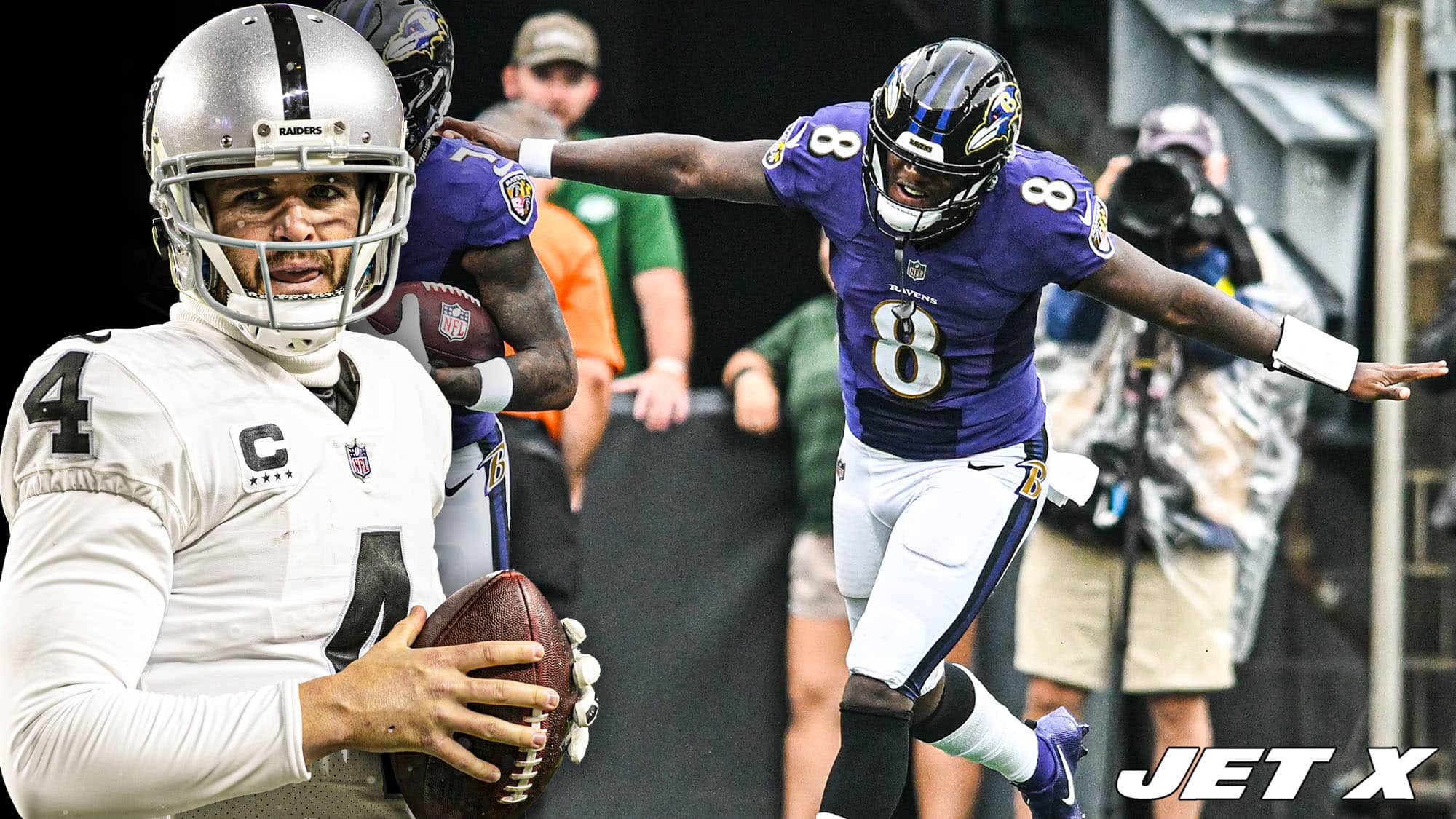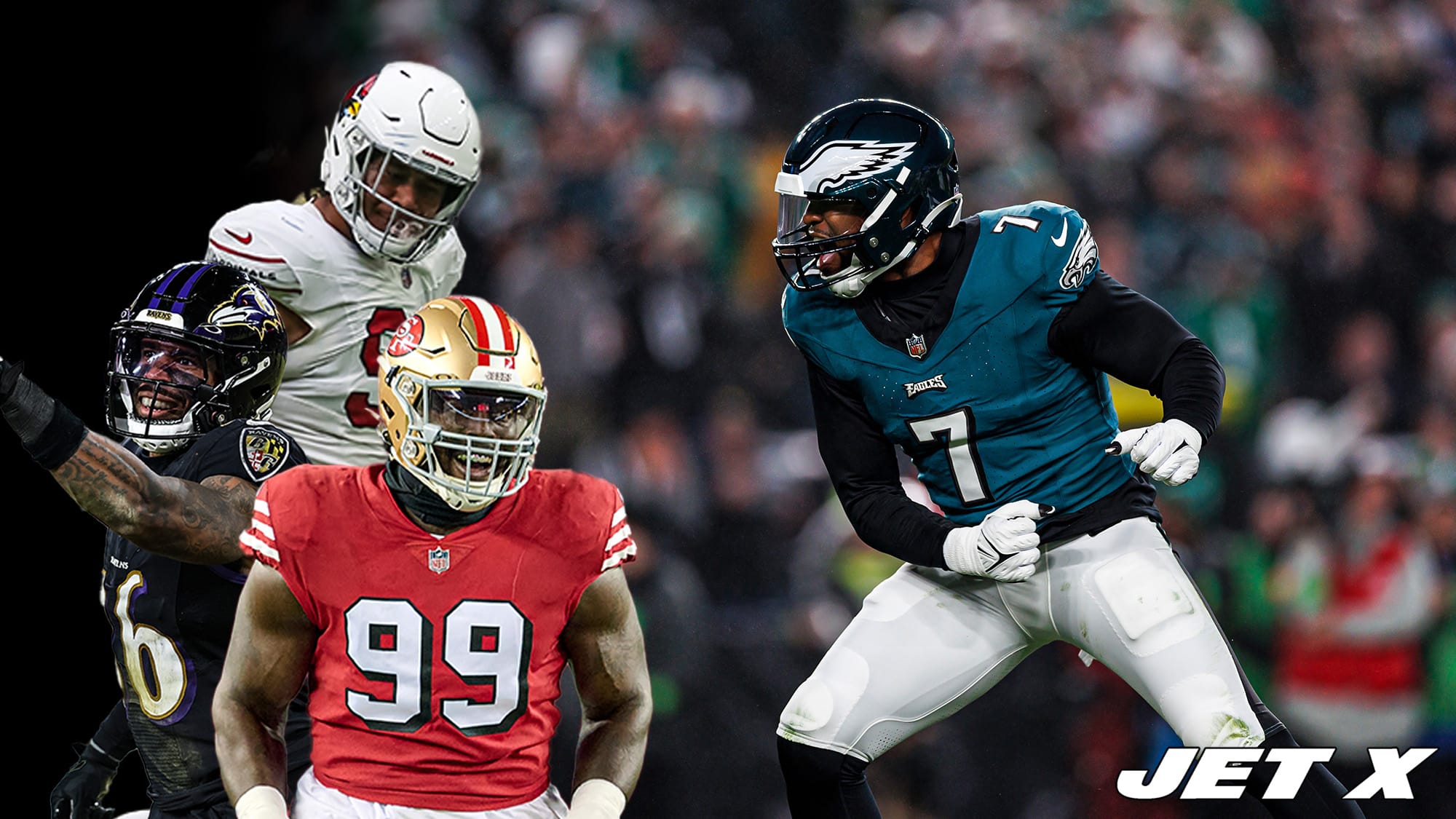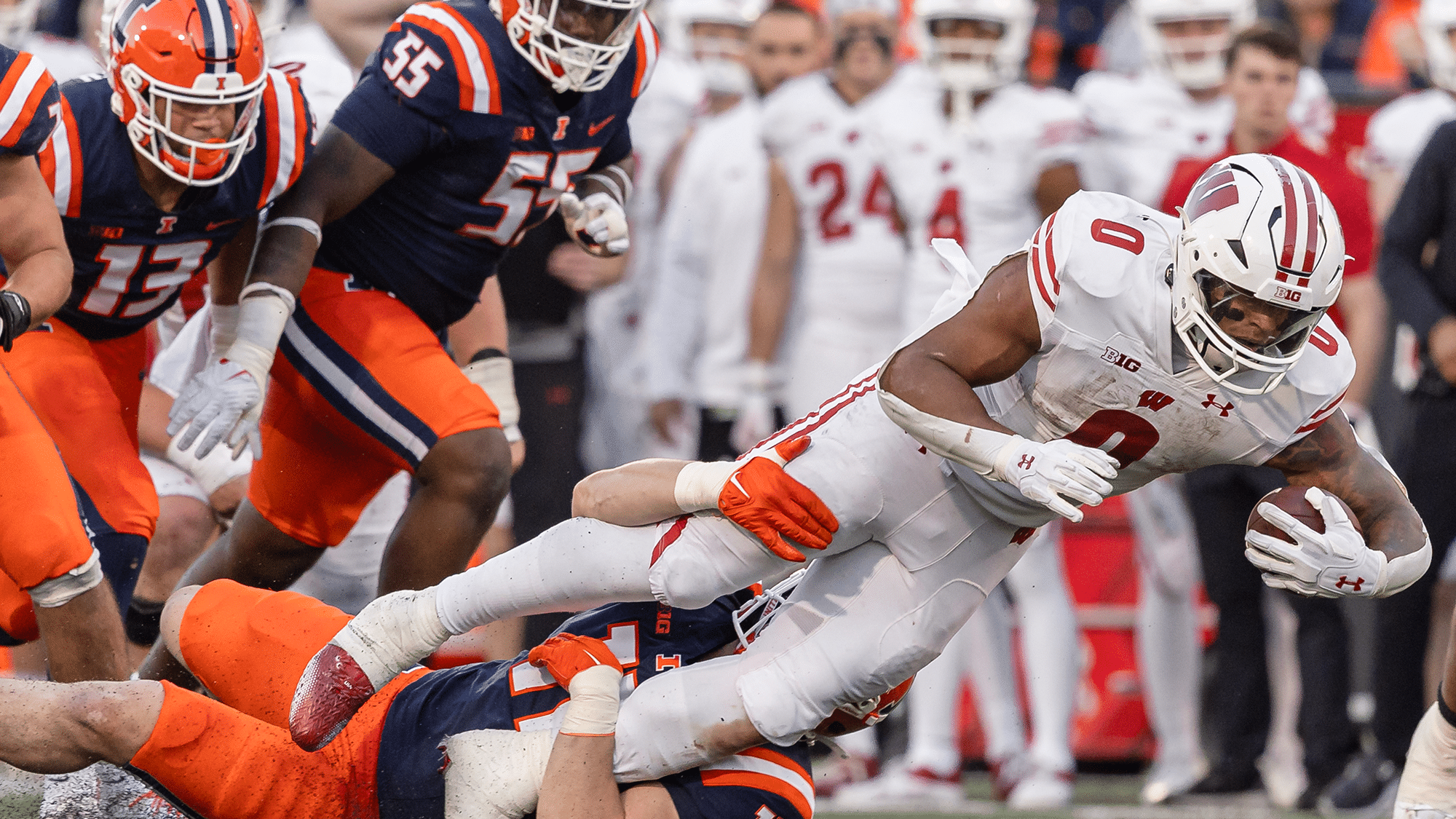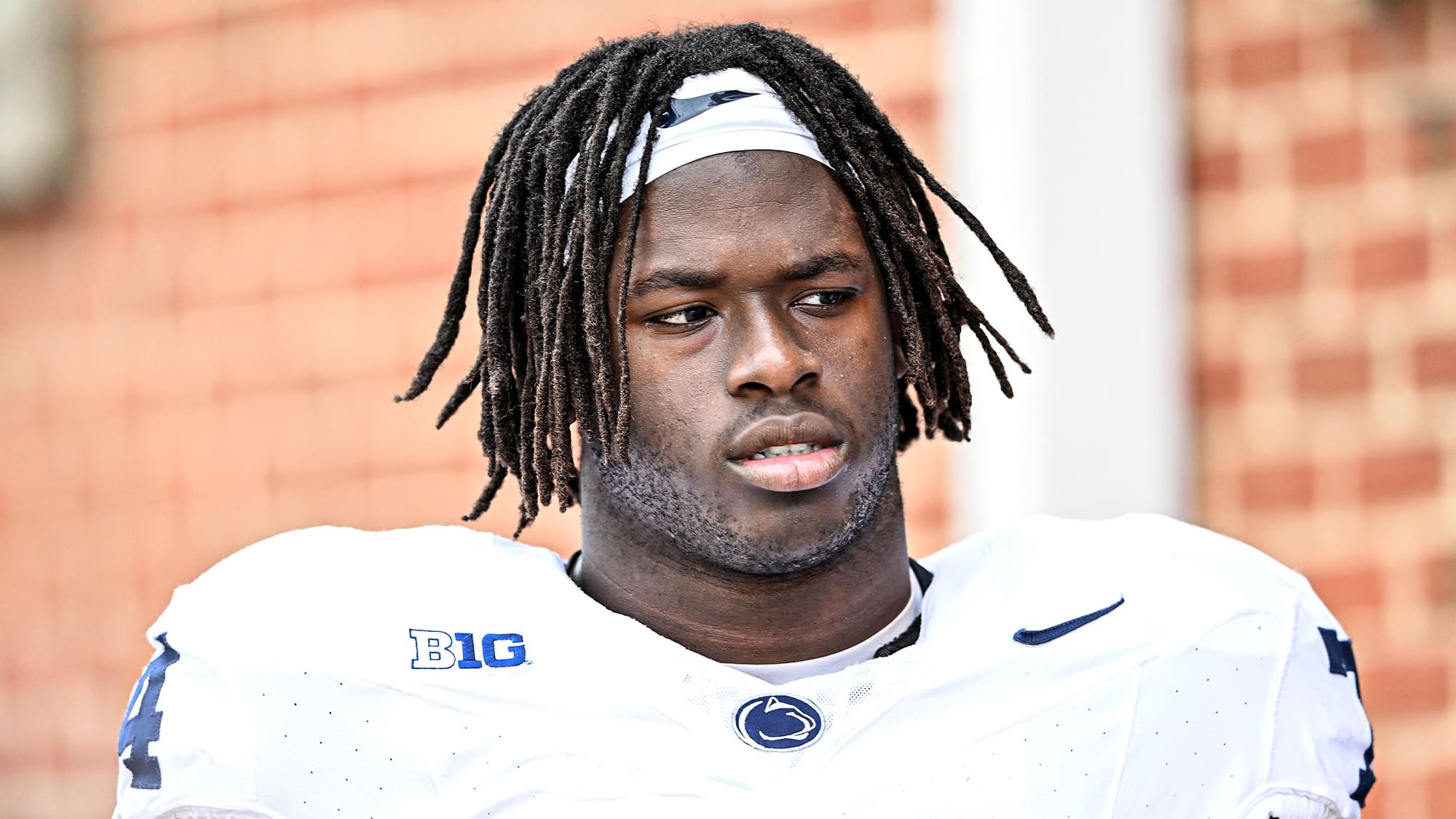Who should New York Jets pursue: Derek Carr or Lamar Jackson?
Derek Carr and Lamar Jackson are certainly the two most frequently mentioned quarterback targets for the New York Jets. In fact, the Jets are among the top betting favorites to land both quarterbacks. There seems to be a very real chance that one of these two signal-callers is under center for Gang Green in September.
Let’s compare Carr and Jackson head-to-head in important categories – both on and off the field. We will start with some of the off-field categories before moving into their on-field performance.
Trade assets required
Trading for Jackson will require New York to sell the farm. Baltimore will most likely place a franchise tag on Jackson and either extend him or hold onto him until they can trade him for a package similar in value to the ones fetched for Russell Wilson and Deshaun Watson.
If the Ravens place a non-exclusive franchise tag on Jackson, he will be free to negotiate with other teams and the Ravens will have a chance to match any deal he signs. Baltimore would be entitled to two first-round picks in exchange for Jackson if they elect not to match his offer sheet.
However, the Ravens can most likely get more than two first-round picks for Jackson. Wilson brought in two first-round picks, two second-round picks, and three players. Watson netted three first-round picks and a third-round pick.
With this in mind, the Ravens will probably place an exclusive franchise tag on Jackson. This means he cannot negotiate with other teams. Jackson would be stuck in Baltimore until the Ravens find the gargantuan haul they feel he is worth.
Carr, however, must be traded or released by the Raiders before February 15, which is when his 2023 salary becomes guaranteed. Las Vegas has no leverage due to this deadline. If Carr is traded, the package will be small. There is a chance he doesn’t get traded at all.
Advantage: Carr
Cap space required
On his current deal, Carr is set to have a $34.9 million cap hit in 2023, which currently projects to rank ninth-highest among quarterbacks (he’ll drop a few spots after more deals are signed, including Jackson). The number rises to $43.9 million in 2024 and steadies at $43.1 million in 2025. But Carr can be released after 2023 with a dead money charge of only $3.8 million. It’s not a deal that requires heavy long-term commitment.
There is a chance Carr signs a new contract, whether he restructures post-trade or simply gets released. If he does, it seems unlikely his new deal goes beyond the cap hits of his current one, although the guarantees might be higher. I could see Carr demanding a deal that has more guaranteed money if he gets traded. No matter how you slice it, though, it seems unlikely that Carr’s cap hit will ever rank higher than the No. 10 spot among quarterbacks in any of the next few seasons.
Jackson is probably going to fetch a monster deal that lands in the neighborhood of the ones signed by Wilson and Watson. Wilson signed a five-year, $242.6 million deal with $161 million guaranteed. Watson signed a five-year, $230 million deal that is fully guaranteed.
Watson had the largest cap hit among quarterbacks this season at $55 million, which is the exact number he will have each year through 2026. Wilson’s deal is backloaded, as his 2022 hit was $22 million and his 2023 hit will be $35.4 million, but his cap hit will be above $53 million each year from 2024 to 2028.
According to ESPN’s Adam Schefter, the offer Jackson rejected prior to 2022 was a six-year, $250 million deal with $133 million guaranteed. Jackson is certainly aiming for Wilson/Watson territory.
Advantage: Carr
Durability
Carr has only missed three games in his career due to injury (2 regular season / 1 playoffs), the most recent of those coming in 2017. He’s never played fewer than 15 games in a season.
Jackson was extremely durable over his first three years. He missed only two games from 2018-20 and neither of those was due to injury (one was for rest and one was due to COVID-19). However, his mobile style has started to catch up with him over the past two years. Jackson missed five games in 2021 and missed another five in 2022. He also missed the Ravens’ playoff game this year, giving him a total of 11 games missed over the past two years.
Advantage: Carr
Ceiling
This one does not require much discussion. Jackson was the unanimous league MVP at 22 years old in his second season. Carr tied for third in MVP voting back in 2016 but has not received MVP votes in any other season.
Jackson has already proven he has the ability to be the most dangerous quarterback in the league. Carr will probably never reach a level anywhere close to that.
Advantage: Jackson
Floor
Carr has a pretty high floor. Over eight years since his rookie season, Carr has never had a completion percentage below 61%, a passing-yards-per-game average below 233, a passer rating below 86, or a net-yards-per-attempt average below 6.2 (for reference, the 2022 league average for NY/A was 6.1). For those being his absolute worst marks over nearly a decade, that’s quite reliable.
Jackson’s floor is also high. Over four years since his rookie season, Jackson has never had a completion percentage below 62%, a passer rating below 87, a net-yards-per-attempt average below 6.1, or a combined average of less than 250 passing and rushing yards per game. Again, for those being his worst marks, that’s a solid worst-case scenario.
Simply put, both quarterbacks have been no worse than middle-of-the-pack throughout their careers. Neither quarterback has shown they are susceptible to having a truly “bad” year.
The mystery for Jackson is how low his floor might get in the future if his rushing ability wanes due to injuries. Will he be able to maintain the floor of a league-average passer once his legs are no longer a dangerous threat? Or will his passing efficiency decline once teams are less afraid of him on the ground?
Because of the uncertainty of Jackson’s long-term projection, Carr offers the higher floor. He’s proven over eight years that he will probably never be much worse than a league-average quarterback. That also might be true for Jackson, but we just cannot be sure yet until we see him prove it over a longer period.
Advantage: Carr
Deep passing
Here is where Carr and Jackson ranked in adjusted completion percentage on deep passes (20+ yards downfield) over the past four years:
- 2022: Carr, 39.4% (23rd of 35) – Jackson, 31.9% (32nd of 35)
- 2021: Carr, 39.7% (25th of 35) – Jackson, 40.7% (22nd of 35)
- 2020: Carr, 53.3% (2nd of 38) – Jackson, 42.3% (23rd of 35)
- 2019: Carr, 43.8% (16th of 35) – Jackson, 41.8% (19th of 35)
*Adjusted completion percentage accounts for drops and throwaways.
And here is where they ranked in EPA (Expected Points Added) per attempt on deep passes – which is more a measure of overall efficiency and production rather than merely accuracy:
- 2022: Carr, 0.55 (11th of 35) – Jackson, -0.36 (34th of 35)
- 2021: Carr, 0.52 (14th of 35) – Jackson, 0.08 (28th of 35)
- 2020: Carr, 1.23 (1st of 38) – Jackson, 0.29 (19th of 38)
- 2019: Carr, 0.40 (16th of 35) – Jackson, 0.59 (10th of 35)
Carr is generally a good deep passer. While his accuracy on deep passes has dipped in the past two years, his efficiency has remained solid, and that is because he throws a lot of deep touchdowns. Carr ranked second with 11 deep touchdowns in 2022 and was sixth with 7 deep touchdowns in 2021.
Jackson typically struggles on deep throws. Outside of the MVP season where he was efficient on bombs, Jackson has consistently ranked low in both accuracy and efficiency on deep passes.
Advantage: Carr
Intermediate passing
Here is where Carr and Jackson ranked in adjusted completion percentage on intermediate passes (10-19 yards downfield) over the past four years:
- 2022: Carr, 52.9% (33rd of 35) – Jackson, 74.2% (1st of 35)
- 2021: Carr, 68.8% (4th of 34) – Jackson, 67.1% (5th of 34)
- 2020: Carr, 63.1% (21st of 35) – Jackson, 67.9% (12th of 35)
- 2019: Carr, 76.5% (2nd of 35) – Jackson, 64.9% (14th of 35)
And here is where they ranked in EPA per attempt on intermediate passes:
- 2022: Carr, 0.30 (24th of 35) – Jackson, 0.77 (1st of 35)
- 2021: Carr, 0.35 (15th of 34) – Jackson, 0.49 (9th of 34)
- 2020: Carr, 0.29 (23rd of 35) – Jackson, 0.53 (13th of 35)
- 2019: Carr, 0.86 (3rd of 35) – Jackson, 0.94 (1st of 35)
This is where Jackson shines the brightest as a passer. He is an elite thrower in the intermediate range, highlighted by a dominant 2022 season where he led all qualified quarterbacks in both adjusted completion percentage and EPA per attempt. Jackson also led the league in EPA per attempt on intermediate throws in 2019.
Carr is erratic in the intermediate range. Over the past four years, we’ve seen him have an elite year (2019) and a terrible year (2022) in this part of the field. His 2020 season was mediocre was his 2021 season was solid. It’s hard to predict what you will get from him in this range.
Advantage: Jackson
Short passing
Here is where Carr and Jackson ranked in adjusted completion percentage on short passes (0-9 yards downfield) over the past four years:
- 2022: Carr, 83.0% (18th of 35) – Jackson, 81.3% (24th of 35)
- 2021: Carr, 87.5% (2nd of 35) – Jackson, 83.2% (15th of 35)
- 2020: Carr, 84.8% (12th of 37) – Jackson, 83.1% (21st of 37)
- 2019: Carr, 89.0% (2nd of 34) – Jackson, 84.5% (10th of 34)
And here is where they ranked in EPA per attempt on short passes:
- 2022: Carr, 0.11 (22nd of 35) – Jackson, 0.03 (30th of 35)
- 2021: Carr, 0.17 (12th of 35) – Jackson, 0.11 (20th of 35)
- 2020: Carr, 0.15 (22nd of 37) – Jackson, 0.17 (18th of 37)
- 2019: Carr, 0.19 (7th of 34) – Jackson, 0.27 (4th of 34)
Carr’s accuracy on short passes tends to be very good, but his efficiency on short passes is always less impressive than his accuracy. This is mostly because of his propensity for throwing interceptions on short passes. Carr tied for first in short interceptions this year (5), eighth in 2021 (4), fourth in 2020 (4), and third in 2019 (6). Still, while the picks are concerning, Carr’s top-tier accuracy on the easy throws is a highly appealing trait.
Jackson’s short passing has trended downward since an excellent season in the 2019 MVP year. He was great in the short range that year but followed it up with a couple of mediocre seasons before bottoming out with a poor year in 2022.
Carr takes the edge here, but it’s not as if he has Jackson beat by a landslide.
Advantage: Carr
Under-pressure passing
The Jets will try their best to build a good offensive line for their new quarterback, but if recent history is any indication, there is a reasonable chance that the Jets’ offensive line will struggle no matter how hard they try to beef it up. The injury bug simply hasn’t been kind to the Jets at this position.
So, the Jets would prefer to have a quarterback who can thrive even when he faces a lot of pressure. Let’s see how Carr and Jackson tend to perform under pressure.
Here is where Carr and Jackson ranked in adjusted completion percentage on under-pressure passes over the past four years:
- 2022: Carr, 66.9% (10th of 35) – Jackson, 57.1% (30th of 35)
- 2021: Carr, 70.3% (7th of 36) – Jackson, 67.4% (10th of 36)
- 2020: Carr, 66.7% (16th of 36) – Jackson, 68.5% (13th of 36)
- 2019: Carr, 81.7% (2nd of 35) – Jackson, 67.9% (8th of 35)
And here is where they ranked in EPA per dropback when pressured:
- 2022: Carr, -0.08 (1st of 35) – Jackson, -0.73 (28th of 35)
- 2021: Carr, -0.44 (16th of 36) – Jackson, -0.48 (17th of 36)
- 2020: Carr, -0.42 (18th of 36) – Jackson, -0.19 (6th of 36)
- 2019: Carr, -0.11 (3rd of 35) – Jackson, -0.08 (2nd of 35)
Carr has a good track record under pressure. In each of the past four seasons, he ranked in the top half among qualifiers in both EPA per dropback and adjusted completion percentage. That includes top-3 finishes in EPA per dropback in 2022 and 2019.
Jackson tended to fare well under pressure prior to a bad year in 2022. He was great when pressured in 2019 and had a pair of solid years in 2020 and 2021.
Overall, Carr’s resume under pressure is more consistent.
Advantage: Carr
Ball security
Carr has thrown 99 interceptions on 4,958 passes in his career, giving him an interception rate of 2.0%. Jackson has thrown 38 interceptions on 1,655 passes, putting his interception rate at a slightly higher 2.3%. The 2022 league average was 2.3%, so Jackson is perfectly average when it comes to avoiding picks while Carr is slightly better than average.
Both quarterbacks have been trending down in this area.
In 2022, Carr tossed 14 interceptions on 502 passes for a career-high rate of 2.8%. He had a 2.2% rate in 2021 – this marks the first time in his career he has posted a rate north of 2.0% in back-to-back seasons.
Jackson only threw 9 interceptions on 571 passes over his first two seasons, giving him an excellent interception rate of 1.6%. Over three seasons since then, Jackson has hurled 29 interceptions on 1,084 passes for a concerning rate of 2.7%.
How about fumbles?
Carr has lost 36 fumbles in 142 career starts, an average of 4.3 per 17 games. Jackson has lost 15 fumbles in 61 starts, a nearly identical average of 4.2 per 17 games.
While Carr and Jackson are nearly even in their frequency of losing fumbles, Carr actually fumbles the ball less frequently. Jackson has been luckier when it comes to not losing his fumbles.
Carr has fumbled 80 times in 142 starts while Jackson has fumbled 40 times in 61 starts. This puts Carr at 9.6 fumbles per 17 games and Jackson at 11.1 fumbles per 17 games. Carr has lost 45% of his fumbles while Jackson has been lucky enough to lose only 37.5% of his.
Advantage: Carr
Running ability
Does this need to be broken down?
Okay, fine, we’ll do it.
Jackson is still an elite rusher at the quarterback position. In 2022, Jackson averaged 63.7 rushing yards per game on 6.8 yards per attempt, the second-best Y/A mark of his career. He was averaging 68.6 yards per game if you take out the one game he left early, which would also be the second-best mark of his career.
Jackson’s running ability is something that opponents have to build their gameplan around. Jets fans saw this in Week 1 of the 2022 season. New York’s defensive line played with a patient approach to shut down Jackson’s legs. And that worked, as Jackson ran for only 17 yards. But it came at a cost. Due to their disciplined style, the Jets barely generated any pressure in the passing game, and it gave Jackson the time and space he needed to fire a trio of deep touchdowns.
There are a lot of concerns with Jackson, but the enormous value of his running ability has to be mentioned in any conversation about him. Jackson might be the most dangerous ball carrier in the NFL. If healthy, his athleticism alone makes him a very effective quarterback, simply due to the domino effect that comes as a result of the threat he poses.
To Carr’s credit, he has begun using his legs more often in recent years. Over his first six seasons, Carr recorded only 7.0 rushing conversions per season (either a first down or a touchdown). Over the last three seasons, Carr has averaged 12.0 rushing conversions per season, running for at least 10 of them in each season.
Advantage: Jackson
Strength of support with former team
When projecting a quarterback to a new team, it’s important to consider how well they were supported by their old team.
Weapons
We’ll start with pass-catching weapons.
Carr’s weapons throughout his career could probably be described as decent. In 2022, though, the unit was fantastic, featuring Davante Adams, Darren Waller, and Hunter Renfrow while Josh Jacobs was thriving in the backfield. This is easily the best unit he has been surrounded by.
Before Adams arrived, though, the Raiders’ weaponry peaked at “solid”. Waller and Renfrow led the way from 2019 to 2021. Prior to 2019, Carr had Amari Cooper from 2015 to 2018, although Cooper was all alone in those years. After Waller, Cooper, and Renfrow, the Raiders’ leading receivers in Carr’s career are Michael Crabtree, Seth Roberts, and running back Jalen Richard. Not great.
Jackson has played with an elite tight end throughout his career in Mark Andrews, but that’s about it. Baltimore’s wide receiver unit has been extremely limited in talent. Outside of some solid years from Marquise Brown, the Ravens’ wide receiver unit has been a liability.
Andrews (4,313) and Brown (2,361) are the only players with over 2,000 receiving yards for the Ravens since Jackson was drafted in 2018. Their next-leading receiver is… Willie Snead (1,422). Nobody else even has 1,000 yards with the Ravens over this five-year span.
Those numbers are partially due to Baltimore’s run-heavy offense, but anybody who watches the Ravens will tell you that Jackson has not been adequately supported when it comes to pass-catching talent.
So, in terms of skill-position weaponry, I’d give the edge to Jackson over Carr in terms of who received less support. If Jackson joined the Jets, it would be the best group of weapons he’s ever played with. Carr’s 2022 group was probably similarly good or slightly better than the Jets’.
Advantage: Jackson
Offensive line
Now let’s talk about the offensive line.
Carr played behind a tremendous offensive line early in his career, back in the days of prime Rodney Hudson, Kelechi Osemele, and Donald Penn. From 2015 to 2017, the Raiders had one of the league’s best lines.
Osemele and Penn suffered injuries in 2018 and would not return the following year. Since 2018, the Raiders’ offensive line has typically struggled.
Meanwhile, Jackson has generally had an excellent offensive line throughout his entire career.
Here are where the Raiders and Ravens’ offensive lines have ranked in pass-blocking efficiency since 2018:
- 2022: Raiders 27th, Ravens 7th
- 2021: Raiders 27th, Ravens 13th
- 2020: Raiders 17th, Ravens 22nd
- 2019: Raiders 6th, Ravens 1st
- 2018: Raiders 26th, Ravens 3rd
*Pass-blocking efficiency measures the percentage of pass-blocking snaps in which the offensive line allows any type of pressure (hurry/hit/sack) while weighing sacks twice as heavy as hurries or hits.
Jackson had worse weapons. Carr had worse protection.
Advantage: Carr
Coaching
Now how about coaching?
Carr was forced to deal with a carousel of head coaches with the Raiders. He played for a total of six head coaches over nine seasons. That includes four full-time coaches (Dennis Allen, Jack Del Rio, Jon Gruden, Josh McDaniels) and two interim coaches (Tony Sparano, Rich Bassacia).
Carr also had to play under five coordinators: Greg Olson (2014 and 2018-21), Bill Musgrave (2015-16), Todd Downing (2017), and Mick Lombardi (2022).
Jackson has been lucky enough to enjoy far better coaching stability than Carr. John Harbaugh has been the head coach throughout Jackson’s entire tenure in Baltimore. Only two offensive coordinators have coached Jackson: Marty Mornhinweg was the Ravens’ offensive coordinator for Jackson’s rookie year and Greg Roman has held the role over the past four seasons.
Roman seems to be a despised figure among Baltimore fans, but I’m not sure the criticism is warranted. Roman has an established history of getting the absolute most out of mobile quarterbacks. He was the 49ers’ OC from 2011-14 and the Bills’ OC from 2015-16. Colin Kaepernick and Tyrod Taylor each had their best years under Roman. Both quarterbacks looked like solid starters under Roman and then fell off the face of the Earth once they were separated from Roman.
Clearly, Carr has been hampered by his coaching staff more than Jackson.
Advantage: Carr
Defense
The quarterback does not share the field with his defensive teammates, but the defense still plays a major role in creating a comfortable environment for the quarterback to succeed. When the defense plays well, the quarterback can relax and avoid stressing about having to carry the team. When the defense struggles, the quarterback is forced to hold the weight of the world on his shoulders.
The quality of a quarterback’s defense has a massive impact on his reputation. Winning is all people care about at the quarterback position, but winning is 50% offense and 50% defense. The quarterback can only affect 50% of the game while the defense is responsible for the other 50%, and yet, the football world charges quarterbacks with 100% of the credit for a team’s record (good or bad).
Win a game 16-9 with 100 passing yards? You’re a winner who finds ways to get it done! Lose a game 34-30 with 350 passing yards? You’re a loser who can’t come through when it matters!
Rant over. Anyway, let’s take a look at how Carr and Jackson have been affected by their defenses.
Carr is forced to carry the Raiders every season due to an abhorrent defense. The Raiders have allowed 26.2 points per game since he was drafted in 2014, the most of any team in the league over that span. They have never ranked better than 20th in scoring defense during a single season in Carr’s career.
Jackson enjoys the luxury of playing for a franchise that has a historical track record of fielding elite defenses on a consistent basis, and that has not changed over the last five years. Since Jackson was drafted in 2018, Baltimore has allowed the second-fewest points per game in the NFL at 19.3.
Think about the difference between 26.2 and 19.3. Carr needs 27 points to win his average game. Jackson needs 20 points. That’s one whole extra touchdown per game that Carr must score to be victorious.
Carr has a lot of losses that would have been wins if he had the Ravens’ defense behind him, and Jackson has a lot of wins that would have been losses if he had the Raiders’ defense behind him.
Advantage: Carr
Final results
Here is our scorecard:
- Trade assets required: Carr
- Cap space required: Carr
- Durability: Carr
- Ceiling: Jackson
- Floor: Carr
- Deep passing: Carr
- Intermediate passing: Jackson
- Short passing: Carr
- Under pressure: Carr
- Ball security: Carr
- Running ability: Jackson
- Weaker weapons: Jackson
- Weaker offensive line: Carr
- Weaker coaching staff: Carr
- Weaker defense: Carr
What do you think, Jets fans? If you had to choose one of the two, would you rather see the Jets pursue Derek Carr or Lamar Jackson?












Jackson can’t even be though of. These deals are crazy..two #1s two #2s plus.
Something like this could have been done last year with the assets and cap room but then take Garrett Wilson, Sauce Gardner, Jermaine Johnson Jr and Breece Hall off the team.
Ik we had an excellent draft but when you think deals for Wilson or Watson, this is what would have been lost if we gave up last year’s 2 #1s and 2 #2’s.
Kind of screams these deals don’t fly, especially when after losing those talented players you have to pay Jackson $45m
Just look at Wilson now and wonder if they do that deal again.
Michael
You touched on it in your “trade assets” & “cap space” sections, but “timing” could well have been another, maybe most, important consideration.
If the Ravens do “exclusive franchise” Lamar the process of trading him could drag on for many weeks/months while they extricate the best deal. The Jets’ OC decision and draft/FA decisions are entwined in the QB decision. Carr will be somewhere else by Feb 15, if it’s w/ us we can move forward w/ all our other needs based on his skill set. With Lamar, we could spend weeks negotiating only to be left holding the bag as he (his agent) and the Ravens whipsaw suitors against one another.
Get Carr now…a bird in the hand…
That’s a great point on the timing, I actually did consider including that as a category and probably should have. It’s one of the biggest reasons I prefer Carr. You get it done early and your entire offseason plan can run smoothly. You know how to build around your QB, you know how your salary cap looks, and you avoid all the drama. With Jackson you’re holding onto a prayer for months and you might not even get him.
Great breakdown, and something to think about. I am sticking with the problem for Jackson being the offensive design. Lamar needs an entire offense designed around his skill set, which nobody else can replicate. I not on board with a guy like that, who also misses large amounts of time. There is no shot for a Brock Purdy situation with Lamar, nor does that open the door to develop a guy for insurance purposes. Baltimore is going to tag him so this conversation is fun but far from being a real possibility.
Carr would be my choice (a guy they could have drafted) but again, he holds the cards, I don’t see him making the Jets his choice.
I’m looking Jimmy, Tannehill, potentially Rogers, there will be a surprise, maybe Baker? I hope not. I’ve hear some talk of Brady…not happening. Trubisky…maybe Mariota. I just think it’s going to be very difficult from them to find anybody but a “bridge guy.”
Who do you see him choosing over the Jets? Sounds like he wants to win and among the teams who might be interested, Jets probably offer the best shot
I think the Dolphins, Titans, and Colts will all be in play. I also think the Saints, who also have a good defense and young WR would be interested. A wild card option could be NE. Teams that aren’t as far along as the Jets but could be options Atlanta or Carolina.
The Saints, Falcons, and Panthers all play is the worst division in football, better weather, and have some players I’m sure he’d like to play with, and the opportunity to be division favorites as soon as he arrives.
Jets, Dolphins, Bills, Patriots…..I’m not sure that will be his best shot at a winner but I believe Miami would be more attractive.
I like Carr especially at his contract now where you have outs easily. However I think he will not waive his no trade without a new contract. And if he’s cut, obviously it’s highest bidder. That being said, I think I’d prefer Carr given the cost to acquire.
No question Carr is the answer. I’d offer LV Elijah Moore and Laken Tomlinson. We get rid of a malcontent and an albatross contract while preserving our draft picks. LV gets a promising WR to pair with Davante Adams and a Guard who despite his problems is an upgrade over what they have now. Then sign Greg Olsen as OC, and sign Allan Lazard in free agency. Carr would have Corey Davis and Lazard on the outside with Garrett Wilson in the slot. Book your SB tickets.
I would not trade for Carr. The Raiders are forced to trade or cut him. We should not weaken an already bad team.
It sounds like Carr is the least risk and honestly less impact to draft capital. Once we have a QB we are paying that kind of money to drafting well will be even more important to replace players that are aging or leave via FA. The days of splurging on FA will be over. Getting Jackson and mortgaging all those picks is a tough pill to swallow. Especially given the injury history. Awesome analysis as usual!!